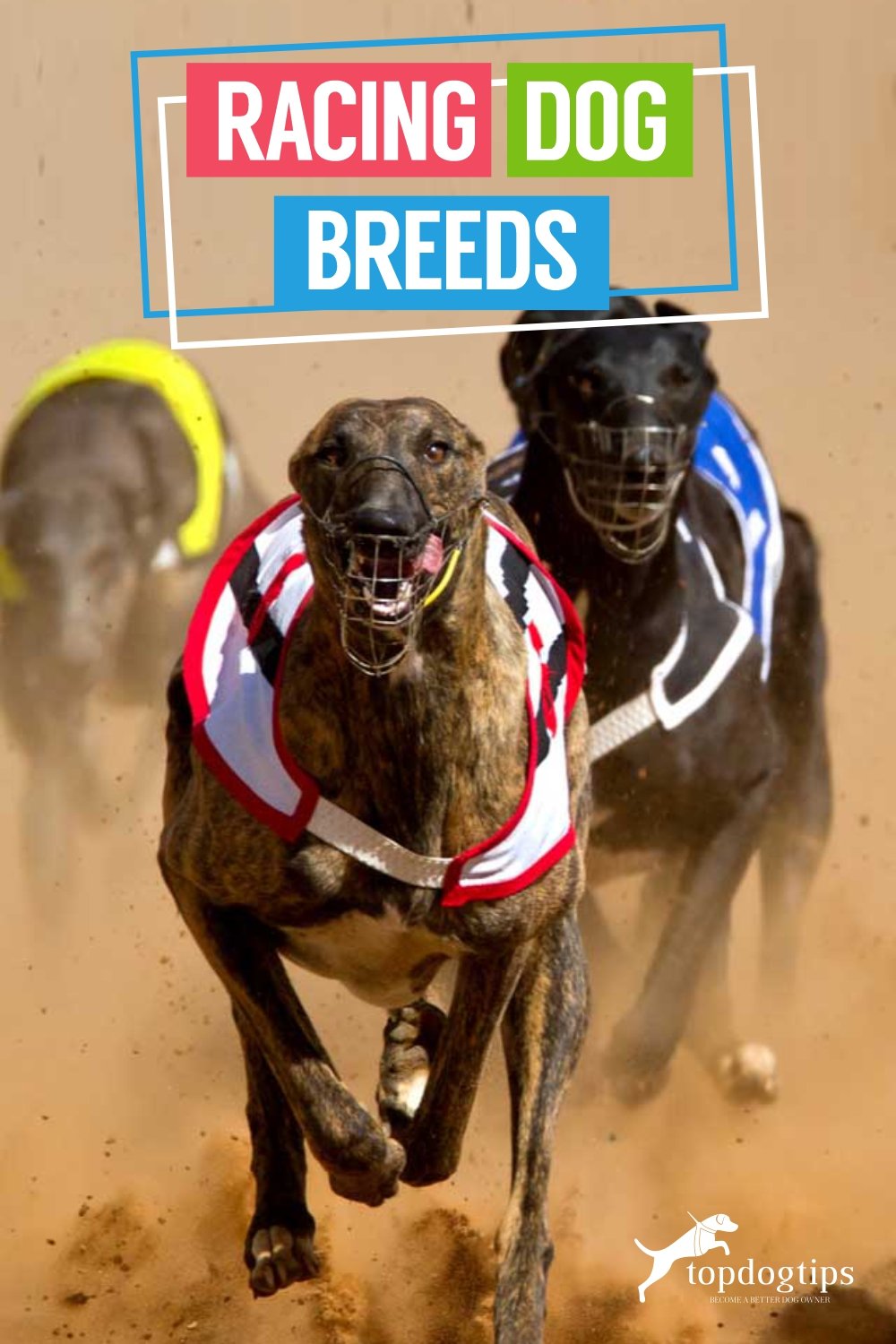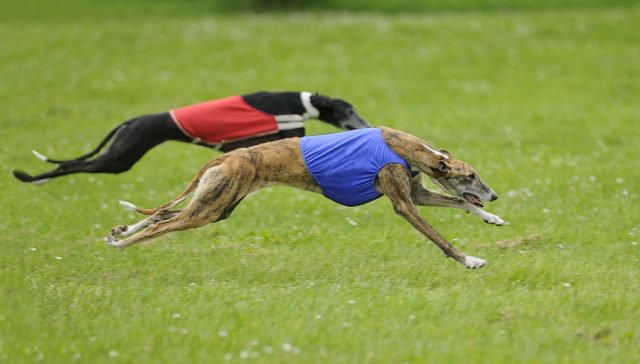
Table of Contents
Although they don’t have their own dog breed grouping, racing dog breeds are dogs built for speed.
In fact, throughout the centuries, many breeders have capitalized on these unique animals, from racing to hunting and more.
With some dog breeds topping 45 miles per hour, it’s no wonder that their speed continues to amaze racing fans and pet owners alike.
If you’re looking for a fast, energetic dog to join your family, consider one of the racing dog breeds highlighted here.
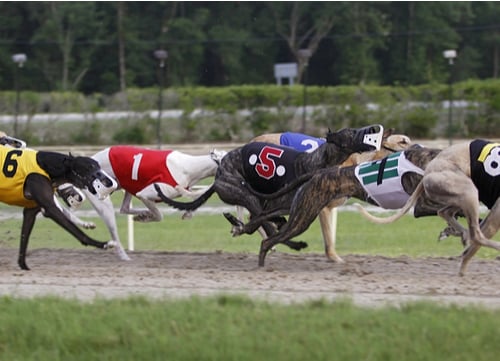
Meet The Fastest Racing Dog Breeds!
1. The Greyhound
Topping our list of racing dog breeds is the greyhound. This is the fastest of the racing dog breeds that can reach speeds of 45 miles per hour.
Greyhounds were originally bred to chase deer, foxes, and hares as hunting dogs.
Now they’re more known for racing. It’s said that these canines have two speeds, hyperdrive and couch potato—making them easily adaptable to a quiet life at home.
Temperament
With a wonderful temperament, this racing dog breed is known for being friendly and non-aggressive.
Greyhounds are intelligent and independent; they recognize tension and stress within the home, typically responding quickly to their environment.
Occasionally, these dogs can become quite timid and shy if mistreated.
Despite its fast and agile nature, the Greyhound is a low-energy dog, often requiring a walk during the day.
They can become destructive when bored, so it’s important to maintain some physical activity in their schedule.
This racing dog breed has a powerful prey drive that will have them ignoring almost any command when something has piqued their interest.
Add the prey drive to their incredible speed; the Greyhound can easily disappear from you if given a chance.
While most Greyhounds do very well with other dogs, cats, pets, or smaller dogs can be seen as prey due to their strong drive.
This may also be true for a dog accustomed to having a cat within the home but chasing animals outside on the property.
Because of this, it’s important to monitor the Greyhound while they interact with others closely.
2. The Afghan Hound
One of the oldest known breeds in the world, the Afghan Hound, has been around for thousands of years.
Although this racing dog breeds a combination of aloofness and dignity, their intelligence and independence truly bring them to life.
Originally from the mountains and deserts of Afghanistan, the Afghan Hound’s flowing coat was used for warmth in harsh conditions.
The Afghan Hound is known as a high-maintenance dog, with a difficult coat needing constant grooming. The coat is fine, with a tendency to easily tangle.
Daily brushing and combing are necessary to keep the coat in good condition.
Temperament
Although these dogs no longer hunt leopards or other dangerous prey, their independence hasn’t changed.
The Afghan Hounds are adaptable and affectionate, allowing them to thrive in virtually any environment.
But don’t let their affection fool you; these dogs are free-thinking and often decide on their own terms when attention, touch, and affection will be offered to their owner.
The Afghan Hound is often a mischievous breed, acting as a “clown” for the family. While this breed is typically level-headed with children (at times acting affectionate), it’s best that the child and pup grow up together.
Ideally, the Afghan Hound would be better suited to an adult companion.
The dog has a lower pain tolerance than other breeds, which can be problematic if a child handles the dog roughly.
This racing dog is also a sighthound and is bred to chase and hunt prey by sight, making them fantastic at lure coursing. However, this same feature makes it imperative that the dog always remain leashed and under your control.
Likewise, ensure that the yard has a high, secure fence to keep the pup inside the yard. These dogs are known for being escape artists and incredibly difficult to catch due to their speed.
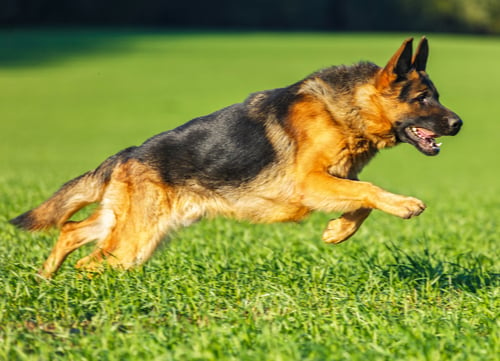
3. The German Shepherd
Clocking in at 30 miles per hour, the German Shepherd can be considered a racing dog breed for their speed, stamina, and intelligence.
Often used by law officials, they thrive under pressure and excel at performing any given job.
The high intelligence of the German Shepherd makes it the perfect candidate for almost any task.
Originally bred to herd flocks, the German Shepherd is a high-energy dog that requires a lot of exercise and mental stimulation.
Without it, you’re likely to find chewed shoes, holes in the backyard, or excessive barking.
Their strong jaws can penetrate and destroy most materials, which creates health and safety concerns.
It’s important only to offer high-quality bones or safe chew toys designed for large breeds.
Temperament
The racing dog breed is known for its aloof but loving nature, meaning it’s likely to attach to its family but not take warmly to strangers.
They make great watchdogs but may not engage with house visitors. It’s important to start socializing your pup at a very young age with people, animals, and new situations.
Their thick fur coat helps protect them from the elements but is known within the canine world for shedding profusely.
It doesn’t matter the season; it seems this breed is constantly replacing the thick, heavy coats.
Despite having the physical attributes for outdoor living, the German Shepherd does better within the family home.
They tend to suffer from separation anxiety when left for long periods of time. Crate training and limiting time away from home can help to alleviate these issues.
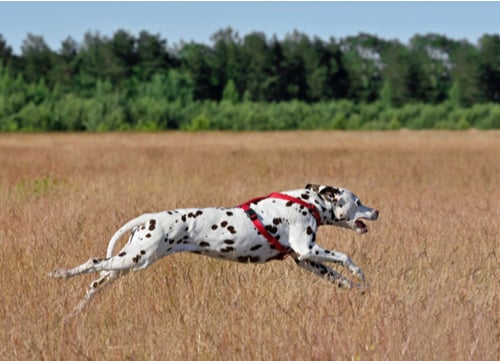
4. The Dalmatian
Despite gaining popularity in the Disney classic, these athletic dogs are built for speed and agility.
They’re known for their work as firehouse dogs, circus performers, and working alongside hunters.
These dogs love to be where the action is, especially when it comes to their family. They have high energy and need plenty of physical exercise daily.
They were originally bred to run beside carriages, making their energy levels seem almost endless. If you’re a runner or jogger, this may be the perfect companion to join you.
Temperament
Along with their high energy levels, many owners are surprised to learn how brilliant these animals are.
They require training from an early age, or they’ll offer to take the reins for you.
The Dalmatian can be a bit headstrong when it comes to obedience, making consistent and firm training a requirement of the breed.
With the proper training and socialization, the Dalmatian gets along wonderfully with both children and other pets. Especially as children typically act as a playmate for the dog.
With their love of games and energy levels, these dogs can be loyal companions to children above six.
It’s important to monitor all situations with toddlers and younger children, particularly due to the muscular, large, and active nature of the Dalmatian.
It’s important to include the Dalmatian in all family activities, including keeping the dog indoors where the family lives and sleeps.
As one of the racing dog breeds, Dalmatians can suffer from social and separation anxiety, hating extended periods of time isolated.
They require early socialization with other pets, people, and animals to avoid any behavioral issues.
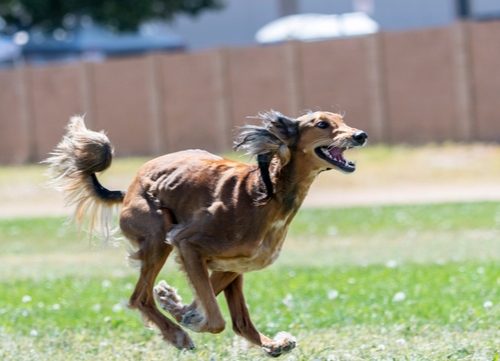 5. The Saluki
5. The Saluki
This racing dog breed has the Guinness Book of Records for the fastest dog.
The Saluki has been documented hitting speeds of 43 miles per hour. Considered one of the oldest dog breeds globally, the Saluki is a force to be reckoned with.
They’re built for speed, with a skinny frame and devotion to their family. This is not a breed to trust off-leash, regardless of how well they’ve been trained, due to their high prey drive.
Whether cat, squirrel or another fast-moving object, any movement is destined to trip their desire to chase, with speeds of nearly 35 miles an hour.
Temperament
This breed requires a well-established fenced-in yard with plenty of room to run; the Saluki will bolt if given the opportunity, making them susceptible to run-ins with vehicles and other hazards.
Although they have excessive energy, the Saluki loves finding comfort inside.
They are a quiet breed but attentive and alert. They can become shy and timid without proper socialization, making early training important.
Although training is possible, The Saluki breed is known to think for themselves, giving their own preference to your command.
This breed is known to become strongly attached to their family, needing to remain connected throughout the day.
The Saluki can be an excellent companion for older children with a love of play and interaction. Although they are not aggressive in nature, their physical build makes them unsuitable for children under eight.
They dislike being left alone for extended periods of time, making them depressed if isolated from the family.
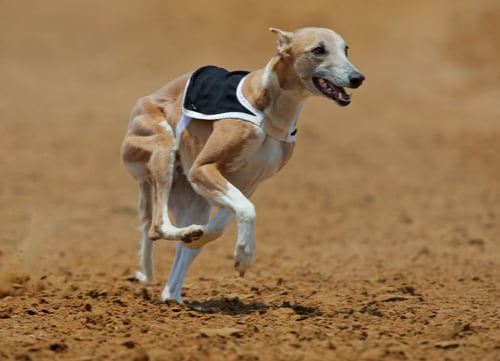
6. The Whippet
Originally, the Whippet was bred to be a hunter’s best friend, especially if they were going after small game like rabbits.
Today, their speed and agility are just as great. With a strong prey drive, the Whippet is known for going after small animals, including cats.
Although you may be able to train your Whippet to socialize and accept the family pet, it’s imperative never to leave the two unattended.
Temperament
It is this prey drive that makes off-leash walking impossible. If they see something small, furry, or just otherwise interesting, even the best-trained Whippet will bolt to the chase.
They are not ones to give up on the chase easily either, with some dogs having chased prey for miles, making recovering your pet almost impossible.
It’s important to remember that Whippets require a fully fenced-in yard, as underground electronic fences are not strong enough to hold a Whippet on the chase.
The Whippet can become fearful of new situations or people, making it important to socialize them early.
At home, this breed is undemanding and gentle, wanting affection and attention. They enjoy playing with children and enjoy snuggling on the sofa at the end of a busy day.
A Whippet can live in an apartment as long as there is a fenced-in area for the dog to run consistently. Indoors, the breed is not active, but they can become destructive if their exercise needs aren’t met.
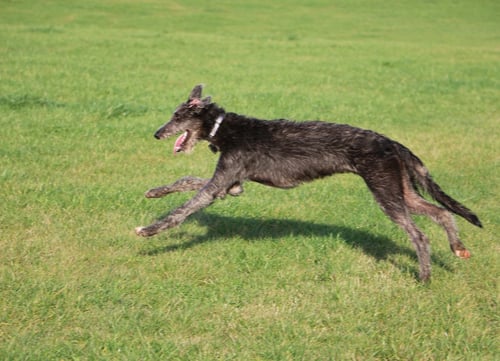
7. The Scottish Deerhound
These large, beautiful dogs are highly affectionate to their humans but aren’t the easiest pets for a novice pet owner.
They have a love of people, whether it’s adults, strangers, children, or other dogs.
He has a loyal and courageous demeanor but makes a terrible watchdog with his friendly nature.
Although they are quite active as a puppy, the Scottish Deerhound eventually becomes quite the couch potato as an adult dog.
These dogs are notorious for being lazy breeds to train, particularly if they find no benefit in training.
Temperament
Despite having low energy within the house, this racing dog breed is not recommended for apartment living due to the need for a large, fenced yard to run.
Their high prey drive will tempt them to chase if left unleashed or without a secure holding in the backyard.
Like other breeds with a high prey drive, electronic fencing is not recommended as it will not deter them from leaving the property.
While it is possible to walk the Scottish Deerhound on a leash, it’s important to remember that the prey drive can and will knock even the heaviest and most capable handler over.
A child should never, under any circumstance, walk a dog on a leash (even older children).
It is strongly advised that any family with small animals or pets not bring home a Scottish Deerhound.
Some Scottish Deerhounds will chase an animal (even with proper socialization and training) within the home. As a result, smaller pets or animals could become injured or killed in the process.
This racing dog breed is exceptionally friendly with almost everyone he meets, including other dogs.
It’s important that other dogs are large enough not to trigger the prey drive. Due to the loving nature of the Scottish Deerhound, they are not suited for protection or watchdogs.
This breed is brave, loyal, gentle, and yet strong but enjoys the company of their family over spending time isolated and alone. As such, they do not make appropriate outdoor pets.
Because of their size, between 90-115 pounds, early socialization is important to ensure a well-adjusted attitude.
Final Thoughts
Racing dog breeds are dogs built for speed; because of this, many breeders have capitalized on this feature by training them specifically for racing or hunting.
As you can see from our list, these breeds can also make wonderful pets for you and your family.
If you’re looking for a special dog to join your family, one of the racing dog breeds may be just right for you.
READ NEXT: 25 Fastest Dog Breeds On the Planet
